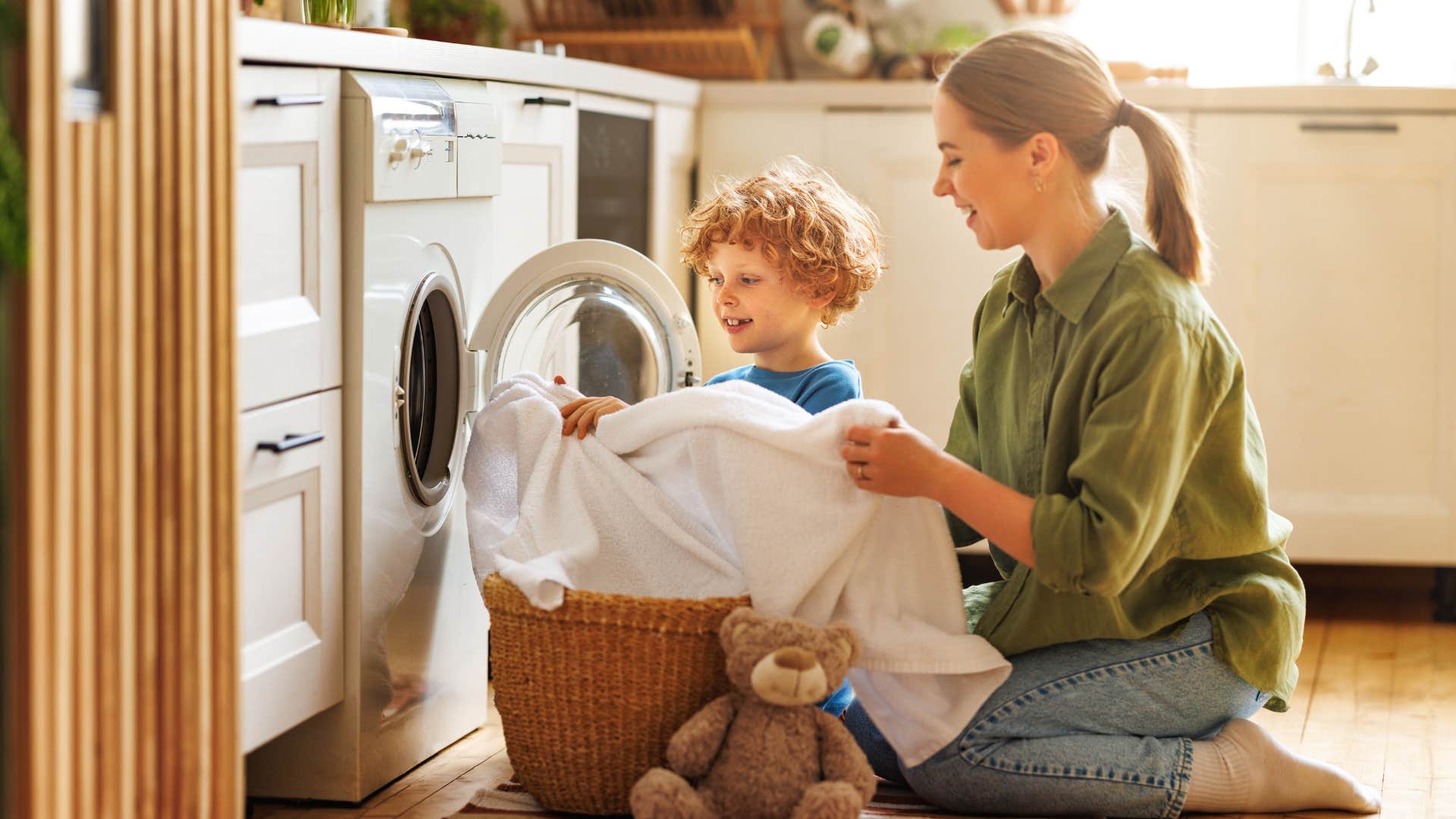11 Ways Millennial Parents Actually Train Their Kids To Disrespect Them
Certain millennial parents habits might not be productive.
 BearFotos | Shutterstock
BearFotos | Shutterstock Parenting is never an easy journey to be on, especially in this day and age. There are a plethora of obstacles that parents have to get around when it comes to raising their kids in a society that's moving a lot faster than it did for older generations. Especially for millennial parents, they may feel this constant pressure of always needing to "get it right" by breaking away from some of those strict, old-fashioned ways of growing up that they experienced.
While they want to raise their kids in homes that feel safe and loving, there are ways millennial parents actually train their kids to disrespect them. Sometimes, in trying to be better than older generations of parents, millennials end up swinging that pendulum too far into the other direction. But being able to notice these bad habits can help millennial parents realize that they're actually sending their kids the wrong message.
Here are 11 ways millennial parents actually train their kids to disrespect them
1. Always giving into tantrums
 fizkes | Shutterstock
fizkes | Shutterstock
Every parent knows the frustration that comes with having your child red-faced, screaming in public over something incredibly small, and all you want is for their meltdown to stop. In the moment, it can feel easier to just hand them a toy, some candy, or maybe even an iPad just to get them to stop.
There's absolutely zero judgment in parents just wanting to have a calm, peaceful experience with their child when out and about, but it can become a problem if that's just the go-to solution anytime they have a tantrum, whether they're in the privacy of their house or out at the grocery store.
"Some kids might want you to hold them, others want to be alone, and others might kick and scream. Let them know you are there for them when they are ready without judgment. Also, make sure they are safe and out of harm's way," encouraged psychotherapist Ilene S. Cohen about how to best handle a child's tantrum.
Once kids learn that by screaming and throwing themselves on the floor, they can be semi-rewarded, they'll just start doing that automatically. The tantrums slowly become less about trying to express how they're feeling and more about getting what they want, because they know the louder they become, the more their parents will fold.
Millennial parents may not even realize that that's their end goal, but that's why it's important to just resist the urge to give into their child and show them that if they want to be listened to, it means having to learn about respect.
2. Letting screens babysit them
 Prostock-studio | Shutterstock
Prostock-studio | Shutterstock
When kids are acting up or parents just need a bit of a break to get things done, it can be quite tempting to just plop them in front of a TV screen or thrust a tablet in their face and allow them to tap away to their hearts desire. But it's actually one of the ways millennial parents actually train their kids to disrespect them.
While it's fine to rely on devices every once in a while when necessary, there's a difference between using screens as another form of parenting when there are many other things that can occupy a child's time without turning them into an "iPad kid."
In fact, research published in JAMA Pediatrics found that too much screen time for kids, especially when they're still babies, can lead to changes in their brain activity, as well as other problems, including being able to stay focused and controlling impulsive behaviors and emotions.
Millennial parents can surely find a good balance between letting their kids have screen time without it having to replace the actual guidance of being a parent. At the same time, kids should still get some sort of healthy time playing outside and with actual entertainment meant for children that doesn't involve them learning over a tablet.
3. Being too much of their 'friend' instead of a parent
 Miljan Zivkovic | Shutterstock
Miljan Zivkovic | Shutterstock
Another of the ways millennial parents actually train their kids to disrespect them is by acting more like a friend than a parent in a position of authority. Because just as children need rules, structure, and consistent consequences as they're growing up, the same can be said for boundaries.
It doesn't mean that millennial parents need to rule over their children with an iron fist to the point where they don't feel like they have a voice in their home. It's natural that millennials feel like that kind of parenting style doesn't work because, for the most part, that might have been their own circumstances as children, and they didn't appreciate their parents being too strict and not allowing them to make their own decisions.
"Kids need to know who is in charge in order to feel safe and secure, and being a friend can blur these roles," pointed out certified coach Sophie Riegel. "It's not your job to make your kid like you, it's your job to keep them safe, even if they don't like it."
But there's a difference between wanting to be a more fun and approachable parent and allowing their child to think of them as some kind of "friend." There's nothing wrong with wanting to be close to your child, but there should never be a friendship there that ends up overriding the authority because, at the end of the day, you're still the parent and they are the child.
When a millennial parent isn't actually enforcing rules or shrugging off the disrespect, it means that children will start thinking of themselves as being on "equal footing" with their parents. It's best to nurture a close relationship with your child while also making sure they know exactly what those boundaries are as well.
4. Playing favorites with siblings
 PeopleImages.com - Yuri A | Shutterstock
PeopleImages.com - Yuri A | Shutterstock
While it's common for parents to maybe like one of their children more than the others at certain times, it doesn't mean that there should be any favoritism happening. Once kids start to notice that their sibling is being favored all of the time by their parents, it can end up creating a plethora of reactions from them, including feeling resentment toward that sibling and/or their parents, as well as acting out in the process. They will deliberately try to challenge their parents' authority as a way to get some kind of reaction and to feel seen when they feel that the attention is never on them.
"Children become aware of a parent's preferences at an early age. Young children, particularly those who are close in age and in direct competition with each other for parental attention, are extremely sensitive to favoritism," explained coach and author Fern Schumer Chapman.
Kids can internalize this favoritism and it'll also just end up souring the relationship that they have with their family as they get older and learn how to really put words to the things they're feeling. The solution to this isn't for millennial parents to suddenly just have no preference with their children, but to be more intentional and consistent about the attention and praise they're giving their children so that it feels equal across all of them.
5. Letting them dictate bedtime
 Pixel-Shot | Shutterstock
Pixel-Shot | Shutterstock
Millennial parents may think they're giving their children more freedom and autonomy by allowing them to choose their bedtime, but allowing them to keep staying up even when they should be in a bed means they aren't actually learning the importance of structure.
They may feel that instead of arguing and having to coax their children to sleep, they can just cave. But by doing that, their child learns that whining and being persistent will end up paying off for them.
Instead of actually respecting the fact that they have a bedtime for a reason and it's not something that can be negotiated all of the time, they'll soon start testing how much whining can help them in other situations. Enforcing bedtime doesn't have to be harsh or cause tears, but it just has to be something that's consistent.
When millennial parents stick to their guns and refuse to budge, their kids will learn that bedtime is just part of their routine and doesn't have to be some sort of power struggle every single night.
6. Never asking their kids to help at home
 Evgeny Atamanenko | Shutterstock
Evgeny Atamanenko | Shutterstock
It can be easy for millennial parents to just do everything themselves. Rather than delegating chores to their children, they feel that it would be easier and faster for them to clean up and organize things around the house without having to involve them.
But when children get into the habit of never being asked or even expected to help out around the house in some capacity, they soon learn that household responsibilities and upkeep just isn't their problem. Rather than having respect for both their parents and the space they live in, they soon just start to feel entitled.
An ongoing study conducted by Harvard found a strong connection between doing chores and finding professional success and happiness later in life. Having shared responsibilities helps children develop a greater sense of self-worth, confidence, work ethic, and even empathy for others.
If they make a mess, they know that their parents will just come up behind them and quickly clean it up. Rather than actually doing anything for themselves, they look to their parents to take care of their every need. By being parented like that, they're missing out on being able to learn some valuable skills.
Things like washing dishes or loading up the dishwasher, learning how to sweep the floor of their room, or being able to fold the laundry wasn't it's done rather than letting it pile up and eventually their parents doing it.
7. Refusing to ever let them hear the word 'no'
 Prostock-studio | Shutterstock
Prostock-studio | Shutterstock
Many millennial parents want their homes to be a positive and guilt-free environment for their kids, which is a good thought but in practice it can very much backfire, especially if they're being raised to never hear the word "no." And by never using this word, it becomes one of the ways millennial parents actually train their kids to disrespect them.
Always giving into the requests of their kids and allowing them to do things like having dessert before dinner whenever they're craving something sweet, or allowing them to spend an extra hour on their iPad right before bedtime, can feel like being kind and flexible in the moment, but it sends a message that they can just do whatever they want at all times.
When kids learn that their desires will always come first, it won't be long before they end up trying to test that with bigger things. When millennial parents avoid actually saying "no" to their kids, they will end up struggling to handle certain emotions and feelings, especially disappointment when they aren't able to get their way.
8. Not holding them accountable for lying
 Prostock-studio | Shutterstock
Prostock-studio | Shutterstock
Lying may be a normal part of a child's development, but when millennial parents are consistently allowing them to slide without addressing them, it can send the message that being dishonest is acceptable.
Even if they're lying about something small like whether or not they brushed their teeth before bed or if they actually completed their homework before being allowed to play video games, it can end up becoming a part of their routine and, before you know it, they can end up lying about much bigger things because they know there will be zero consequences.
Their respect for authority soon begins to crumble and they start seeing the structure that might have been set in place for them as something that they can choose to follow rather than something that's expected of them.
Lying can quickly become a habit at home, school, with their friends, and eventually as they get older, it'll seep into how they interact with the world as adults. Nipping it in the bud before it escalates is something millennial parents should do to make sure their kids turn out to be trustworthy people.
9. Never letting them fail
 PeopleImages.com - Yuri A | Shutterstock
PeopleImages.com - Yuri A | Shutterstock
Parents always have the instinct of wanting to protect their kids from having to face being disappointed or working through failure. Millennial parents may want to just shield them from ever having to experience setbacks, but when kids are taught that avoiding failure is a good thing, they start to believe that life is just always supposed to go smoothly and that someone will always step in to help when things get hard.
Soon, they will start to get the sense that working hard and getting back up when you lose is just optional because the consequences of losing have always been removed from their path. But experiencing failure is such a crucial part to building both resilience and respect.
When kids stumble and actually face the results of their choices, they learn accountability. They're able to see that actions have outcomes and sometimes we might not enjoy those outcomes as much as we may have enjoyed making that choice.
Kids who aren't being raised to learn that won't ever think they need to listen to the adults around them and will be conditioned to never put themselves in a position to even fail, which will only hurt them in the long run.
10. Never following through on consequences
 DimaBerlin | Shutterstock
DimaBerlin | Shutterstock
Once kids learn that their parents are good at threatening consequences versus actually following through on them, it'll be easier for them to act out knowing there won't be any repercussions.
Millennial parents may threaten to take away their child's screen privileges or being able to hang out with their friends if they don't have their room clean by the end of the day, only to go back on their word because they might be too trained to go toe-to-toe with their child. In the moment, it can feel easier to just live to see another fight, but from the child's point of view, they are learning that rules don't have to be followed.
"Young children do need us to pay attention and do something about it when they're out of control, or behaving in cruel, sneaky, destructive, dangerous, or antisocial ways. It's our job as the adults in their lives to protect them from themselves when they're engaging in behavior that will get them in trouble now, or in another context in their lives," explained developmental psychologist Dona Matthews.
However, children are at their best when there's consistency in all areas of their lives. If parents aren't being strict about the rules that exist, a child will have no problem continuing to push against that line until they get what they want. Why would they take their parents' warning seriously if they themselves don't follow it either?
It might feel exhausting for millennial parents to enforce every single consequence, especially if that was their experience with their own parents, but the payoff is simply worth it when it comes down to a child learning about what it means to listen and respect boundaries.
11. Giving endless 'one last chances'
 Dasha Petrenko | Shutterstock
Dasha Petrenko | Shutterstock
When parents tell their kids "this is your last chance," it's usually supposed to signal a firm and serious warning. If they continue acting out or making those choices, there will be serious repercussions, including a punishment of some sorts.
It's supposed to be a phrase that quickly puts kids in line, but when millennial parents start saying it all of the time but actually don't mean it at all, kids will quickly learn that they can get away with disrespect. If every single "this is your last chance" is followed by another warning of sorts or nothing at all, children will soon learn that limits are meant to be bent a little.
They learn that it's actually a loophole that they can exacerbate to their will. Once you've told your child that was their "last chance," stand on it. If they choose to walk that line despite the warning, that's when parents should quickly show them what happens when warnings and, more importantly, boundaries are being intentionally crossed.
Kids need to understand that warnings are something serious and that their parents' words do have weight behind them.
Nia Tipton is a staff writer with a bachelor's degree in creative writing and journalism who covers news and lifestyle topics that focus on psychology, relationships, and the human experience.

